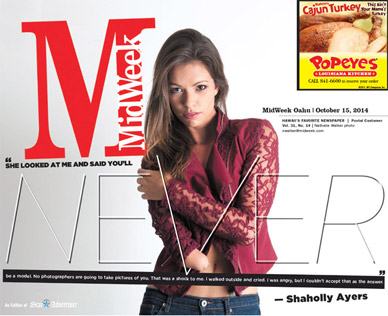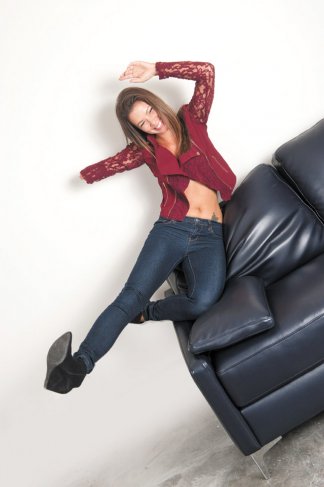Never Say Never
Teased and bullied as a child on the Mainland because of her handicap, Shaholly Ayers finds acceptance — and a modeling career — in Hawaii
Shaholly Ayers may have been born with a partial right arm, but she hasn’t let her disability stop her from reaching her dreams, including becoming a fashion model.
Her “big break” finally came earlier this year, when Nordstrom selected her as one of the models for its popular Anniversary Catalog that was shot in New York. It recently photographed her again, this time for the upcoming Winter Catalog. This month, she heads to L.A. Fashion Week for press photos with Alex Minsky, a U.S. Marine who lost a leg in Afghanistan and since has become one of the hottest underwear models. Next, she’s scheduled to do a photo shoot for lululemon and UNYQ prosthetic covers.
Rejection is never easy, especially for models who are just starting out. But for Ayers, it’s something she’s dealt with all her life. So it’s a good thing she’s learned to not take no for an answer.
Born in Florida and raised in an isolated area of Central Oregon called La Pine, Ayers moved to Hawaii 10 years ago to attend Hawaii Pacific University. It was here she decided to pursue her childhood dream of modeling.
“I went to an agency, and the agent looked at me and said, ‘No, there’s no way,'” recalls Ayers. “‘You’ll never be a model because you’re missing your arm. No photographers are going to take pictures of you.’ I said, ‘But I have a prosthesis.’ But she said, ‘It doesn’t look realistic enough.’
“That was a shock to me. I walked outside and I was really angry and, of course, I cried. But I couldn’t accept that as the answer.”
Ayers decided to reach out to local photographers and found some who not only agreed to shoot her, but also believed in her. She built a portfolio and went back to that agency. This time, the same agent who turned her away looked at her portfolio and was so impressed by her photos that she signed her.
That was about eight years ago. Unfortunately, she wasn’t getting any modeling jobs, so she continued to shoot with photographers, network and tried to find work herself. That’s when she discovered Models of Diversity, an organization in the U.K. aimed at changing the fashion industry to include diverse people.
“Not just people with disabilities, but people of all shapes and sizes,” explains Ayers. “My main purpose for modeling is to use it as a platform — to make people think about what they find attractive. And I hope eventually that will spark some thought about why we treat people who are different the way that we do. I want to change the stigmas of disability. I want to change it from being something that’s ugly, unattractive and scary to something that is more inclusive.
“Just because I’m missing my arm doesn’t mean I can’t do anything; I can do everything. Just because I look different doesn’t make me different inside.”
Models of Diversity recruited Ayers, and she signed with it. She also changed her local agent and is now represented by Wilhelmina Hawaii.
While her passion is modeling, with hope of working in Europe and being on the cover of Vogue Paris, Ayers has an MBA with an emphasis on marketing, and a bachelor’s degree in humanities and philosophy. She works part time in marketing for Florida-based Global Disability Inclusion, and is looking for a full-time job.
“I would like to work for an ad agency doing marketing and advertising,” she says. “I’m more of a creative person.”
Ayers, 29, has three brothers and was a tomboy growing up. She played basketball in high school, and enjoys playing football, bodyboarding, yoga and going to the gym. She also loves to swim and snorkel, and is learning to kayak and play the guitar.
As for daily tasks, she drives, ties her own shoes and can even put her hair in a ponytail. “My parents always taught me, ‘You’re made like this for a reason,'” says Ayers. “‘You’re fine. There’s really nothing wrong with you.’ They didn’t treat me any different from my brothers. They made me do chores and take in the groceries.
“There was no special treatment, which I think was healthy, but then it was confusing because I felt so normal at home while the whole outside world was constantly judging me. I didn’t know I was disabled until a kid told me I was.”
Ayers’ parents weren’t aware of their beautiful baby girl’s condition until the day she was born. Doctors told them it was amniotic band syndrome, where the amniotic bands get tangled with the fetus — in Ayers’ case, with her right arm, cutting off the circulation right below her elbow.
In school, Ayers says she was teased, bullied and abused.
“It was really hard, and it wasn’t just children, but adults were mean to me as well,” remembers Ayers, who also admits to having gone through depression in seventh grade and even thoughts of suicide later in life. “But I was very fortunate to have the parents I have and the support system I had. I also just always felt like eventually this has to get better.
“Also, Hawaii, I think, is really what saved me. It’s such a magical place. The sun is always shining. The culture here, it’s a lot more accepting. It didn’t seem as judgemental as what I was used to.”
Ayers also volunteers as a basketball coach for Special Olympics, and has done volunteer work for Shriners Hospital.
“In life it’s easy to become distracted from our dreams and goals, whether by outside temptations or by simply losing faith in ourselves,” she notes. “But our dreams are limitless and boundless. Nothing is beyond our reach. Dream your dreams vividly until they become a reality!”







